#the cleric in question belongs to someone else in my d&d group
Text
Doodlin' in my travel notebook, trying to work out how to draw Morris's BG3 hair without him turning into Bruno from Encanto. Just for funsies while waiting for a flight, nothing pretty here.
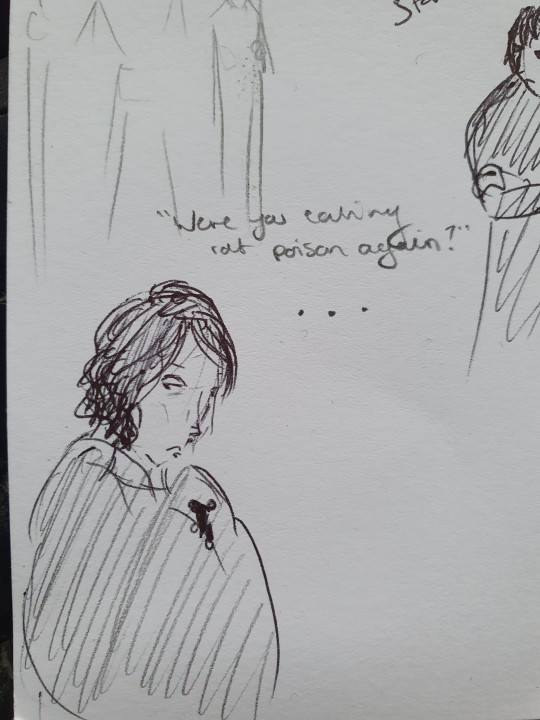




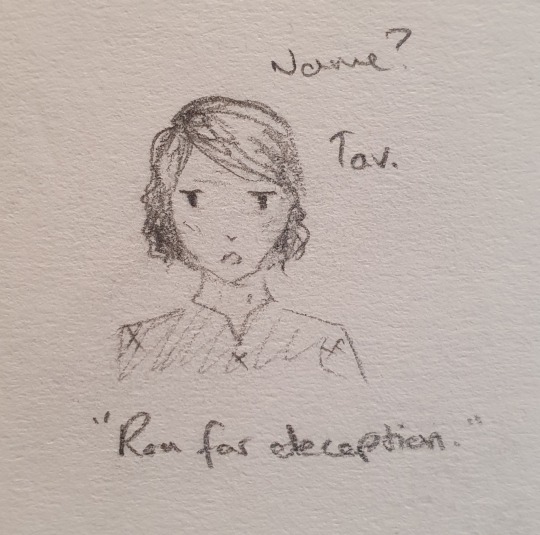
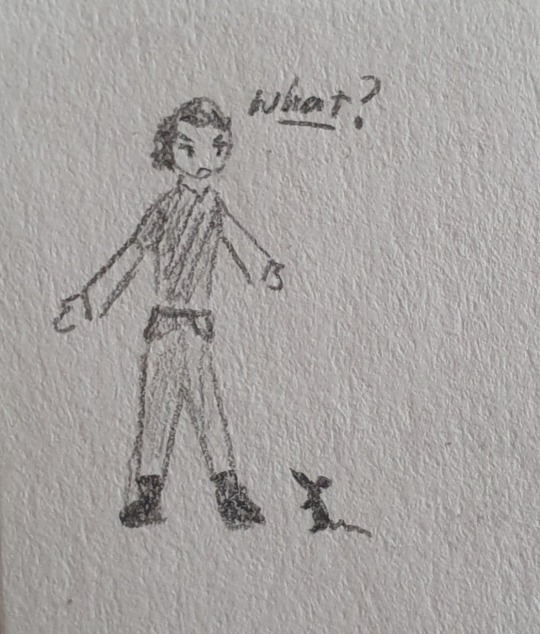
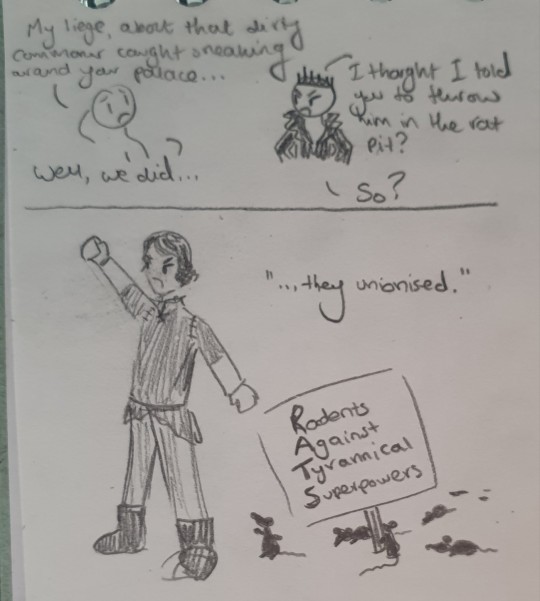
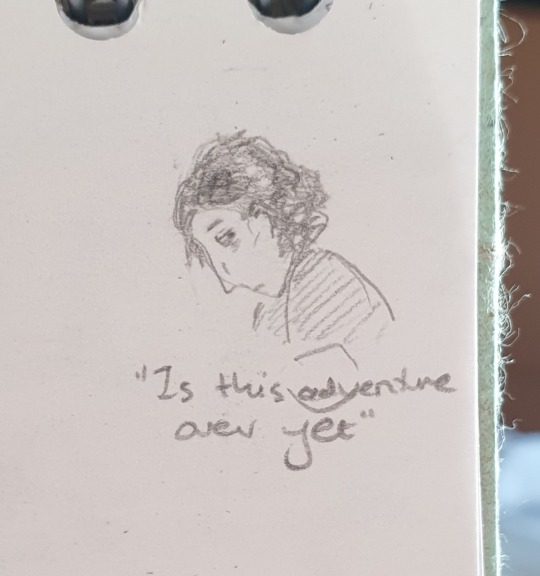
I was so adamant when I created him that his features weren't long and rat-like because that would be clichéd. Now: SO LONG VERY POINTY
#druid pol morris#the cleric in question belongs to someone else in my d&d group#morris doesn't dislike clerics generally#(unlike druids)#1 is basically a squiggle but I kinda like that it looks as if he's wrapped in a blanket cuddling the rat he just saved from poison#5 is his very tranquil and composed reaction to illithid infection#also got one of him playing with a rat but I kinda want to draw that properly one day#I need to get back into practice with actually trying to draw facial structure rather than a pointy sort of circle :/
5 notes
·
View notes
Text
“My guy” syndrome and the Gamer Nuremburg Defense: Making Characters That are Fun for Everyone
Here’s the bottom line – and if you don’t read anything else in this article, take this to heart: It doesn’t matter if it’s fun to play AS your character if that character isn’t fun to play WITH. Play a character that you would LOVE to hang out with for four hours every week, because everyone else will have to.
It doesn’t matter if it’s fun to play AS your character if that character isn’t fun to play WITH. Play a character that you would LOVE to hang out with for four hours every week, because everyone else will have to.
Share15
Tweet1
+11
Reddit1
Email
We’ve all seen this, before, right?
“My character would absolutely report you to the town constable. It says “lawful good” right there on the character sheet!”
“Nah, my character would totally kill the prisoner when the party isn’t looking because I follow Bane, the god of murder. It doesn’t matter if the prisoner is the only one who knows where the secret entrance is.”
“My character’s goal is that no orphan ever goes hungry so I’m going to give all our gold to the orphanage. You know I was a starving orphan back in the day.”
“This character has an 8 INT and they’re just dumb and didn’t know not to drink all the healing potions.” (or 8 WIS)
What these people are saying is “I am not a jerk, or an idiot, or trying to sabotage the game, I’m just roleplaying my character.”
News flash, folks, YOU are the person who decided what that character was like. You aren’t “just following orders” from “your guy” (the Nuremberg Defense). YOU are 100% the sole root cause of the problem.
Often, this starts off pretty innocently. You might be building a paladin that’s extremely devoted to the tenets of law and order and justice, or a cultist who’s only way to survive in the cult was to be the most bloodthirsty person left, or a rogue that steals from the rich and gives to the poor. However, taken to a selfish extreme, many character concepts can rapidly become toxic! This happens when a player loses sight of what the game is supposed to be. Ideally, D&D (and other RPGs!) are collaborative stories that involve a whole group of people telling a story together. The toxicity occurs when a player decides that THEIR fun is more important than the TABLE’S fun.
This doesn’t mean that every character has to be likeable. They just have to function in a way that provides fun for the other players.
Part of that is a natural give-and-take between the types of characters. A rogue who plays fast and loose with the law and other people’s belongings isn’t going to have a whole lot of fun in a party of super square lawful good clerics and paladins without a lot of player investment to make things fun for those super squares. Sure, you can lay that on the DM’s lap, and let them try to figure it out, but don’t they have their hands full already? I’m not saying that you have to sacrifice EVERYTHING for the other people at the table and only play characters designed to compliment the others. What I am saying is you should have a long, hard think about the other players and characters at the table, and talk to them about how your characters will work and roleplay together and take that into consideration.
(While this essay is focussed on and uses examples from Dungeons and Dragons the principles and practices here apply broadly to many other roleplaying games.)
Is it you?
Is It You?
You know the old saying “there’s one at every table, and if you don’t know who it is, it’s you.” Are you reading this and feeling that nervous feeling in the pit of your stomach? Do you remember the last time you asked the other players, in or out of character, how they’d like to handle a certain situation and followed through with their solution? Was it a long time ago? Let’s see if you are that person.
Do significant decisions at your table have to be made because of your character’s ideals, personality, or backstory regardless of what the other players or characters want?
Do you come into conflict with the other players or characters because of how your character acts?
Is your character often the only dissenting voice on a group decision?
Have you ever had to say “but it’s what my character would do?”
If you answered “yes” to those questions, then maybe it’s time to check in with people to see if you’re causing friction at the table. Pull someone aside, privately, and not during a game and ask them how they feel about your character. Take the DM out for coffee and conversation. Definitely do it OUTSIDE the game space. This is a scary decision to make, but I promise you that talking to your fellow players and DMs is a good call. You might try a few lines like this to get people to level with you:
“Hey, I’ve been thinking about how my character gets along with other characters in the game. Sometimes there’s some friction. What do you think?”
“At the last gaming session, X happened, and my character got to decide what our choice was about it. Do you think we’re good at taking turns about who gets to decide?”
“Do I support your character enough when we’re roleplaying?”
Once you have some answers, you can start considering some changes if and as needed. A lot of people will want to avoid conflict and/or spare your feelings. If the responses are a slow or unenthusiastic “no, you’re okay”, then maybe dig a little deeper. Even if the result is a truthful and enthusiastic, “you’re great!” then you have a moment to talk about game dynamics with your group and that’s always a good thing.
Fixing it if it’s you
How to Fix It If It’s You
If you think that this may be you, then that’s good! Now you know and can start making different choices, and that’s going to make you a better roleplayer and a better friend to your group. Remember, the way to fix is is to focus on what’s fun for the group, and not just what’s fun for you.
Take a long while to think about how you play your character and what things cause conflict for the group in a bad way. What is your character absolutely unwilling to budge on? Let’s look at some ways your character can improve into a better team player.
STEP ONE: APOLOGIZE. It takes a real adult to admit that you did something without thinking of how it would affect other people. Talk to your table, your DM first. It doesn’t have to be all at once: one at a time is fine. Let them know that you recognize that you have caused a problem and that you are going to try to fix it. Talk to them about your plans for your character and get their input on your path forward. It’s awkward, but your table will respect you for it.
Talk to your table, your DM first. It doesn’t have to be all at once: one at a time is fine. Let them know that you recognize that you have caused a problem and that you are going to try to fix it. Talk to them about your plans for your character and get their input on your path forward. It’s awkward, but your table will respect you for it.
Share15
Tweet1
+11
Reddit1
Email
STEP TWO: FIX IT. Here are three ways to fix a character that is not working well with your table. You can slightly shift your character concept so it stays true to your character idea AND ALSO works to support your table. You can grow past your original character concept, and slowly make it a part of your character’s backstory so that their evolved persona works well with the other characters. Or you can retire the character, which is sad, but sometimes necessary if you just can’t fix it.
A slight shift. You came up with your character concept. If that’s the problem, you can come up with a slightly different character concept that fits your roleplay and that fits your team.
If you’re the law-and-order type that doesn’t tolerate lawbreaking among the party, then don’t go out of your way to FIND that lawbreaking. You don’t need to be trained in Insight or Perception. Find ways to be someplace else making Perception checks at disadvantage when the lawbreaking is going on. “Yes, it’s time for the Evening Vespers of Ilmater. I’m going to be praying. Right over there. Loudly. With my eyes closed. For at least the next ten minutes.” Cut your party a break from your oversight. Also, talk out-of-character to the player of the smooth-talking character in your party about perhaps roleplaying a discussion of what’s the greater good in some cases. If you’re stealing a horse, in order to save the town, isn’t that worth it? Enlist your party’s help out of character. A convincing Charisma check might be enough to allay your characters suspicions AND you’ve got some great roleplay opportunities baked into the solution.
Here are three ways to fix a character that is not working well with your table. You can slightly shift your character concept so it stays true to your character idea and also works to support your table. You can grow past your original character concept, and slowly make it a part of your character’s backstory so that their evolved persona works well with the other characters. Or you can retire the character, which is sad, but sometimes necessary if you just can’t fix it.
Share15
Tweet1
+11
Reddit1
Email
Growing past it. You came up with a character concept that you now realize is problematic. The GOOD news is that you don’t have to cling to it like an anchor. Characters grow and change from their background and preferences as a story develops. Han Solo in Star Wars isn’t always a heartless mercenary, Sarah Connor from The Terminator breaks from her background as a scared nobody and then breaks from her new background of a driven killer, Neville Longbottom from Harry Potter starts as a bumbling coward but develops poise and bravery, Peter B. Parker from Into the Spiderverse shines when he sheds his jaded hopelessness – there are hundreds of great examples.
If you’re the murderer that’s always slitting throats when the party isn’t looking, consider the long term. The reason why murder-god-cultists are so underground is because most municipalities hunt them down and bring them to justice! Even if the town guard won’t or can’t bring you in, your fellow adventurers probably can. Surely if your character survived this long, they know this already, right? Instead, maybe your cultist is experiencing a revelation: they don’t have to kill every defenseless thing. Maybe they’re shocked when Bane doesn’t personally appear to smite them when they spare someone’s life. Maybe this causes your character to feel unexpected feelings. They could develop into a staunch protector of the weak that has to save two lives for every life they took. Maybe they turn into a cultist-hunter and have made it their personal mission to destroy all worshippers of their former master. Take it slow, as appropriate, to really appreciate the change and the roleplay involved in it. Don’t just show up to the next session saying “hey, my character had a revelation and they’re completely different now!” Growing past that initial toxic concept can be amazing. Sometimes the BEST characters are those that have grown past their history AND you have some great roleplay opportunities as a part of this solution as well.
Retire it. While I’m presenting this as an option, it’s not the best option. I strongly suggest trying to make a slight shift in your concept or growing past it. If you just can’t, or you think that the other players are REALLY over your character, then talk to your DM about retiring that character. Even if you choose to retire them, you can still use some of the same themes and roleplaying hooks that your previous character did by bringing in a related character.
If you’re the person who’s giving away the party gold to your pet cause, maybe it’s time to retire to run your own orphanage. Perhaps one of those fine young orphans who’s just now old enough to be out on their own decides to join the party. Or perhaps one of the attendants of the local temple associated with the orphanage says that they will take your place. That way you can start with a clean slate, and be sure that your new character is one that will do better in the party.
How to Fix It If You’re the Other Player
Okay. So maybe it’s not you. It’s that other person. Here are some steps you could take.
First, make sure you’re sure that the other player has a case of “my guy” syndrome. Talk to another player or two outside the game. Are you the only one who’s getting tired of this? If you’re the only one with a problem then we’re not talking about a case of “my guy” syndrome. You should still talk about your concerns with the other player out of game, with kindness and respect. If you believe you’ve got a solid case of “but it’s just what my character would do!” on your hands realize that the vast majority of the time, the person who is doing this 1) has no idea that they’re consciously doing this and 2) will probably stop doing this once it’s brought to their attention. So start the discussion with the same circumspect kindness that you’d use to tell someone “hey, your pants are unzipped,” and most likely the other person will make some quick changes to fix the problem and everyone can go about their game lives happily.
Start with an assurance that you value the person and that their character has some strong points.
Continue with
Talk to DM
Ask “how is this fun?”
How to Fix It If You’re the DM
How to fix it if you’re the DM
If you’ve got someone in your group who fits the description above, and it’s enough to cause a problem, then they might need a nudge from you to help start the change process. Recognizing a problem exists is a positive thing! That gives you the ability to start fixing the problem.
Talk to your players
Talk to the person
Suggest ways to shift or grow past it
Some Suggestions On Making Characters That Are Fun For Everyone
Talk to your team
need good OOC comms to have good IC conflict
Read the table
Give others the spotlight
HUGE shout out to Greg Stolze who wrote an essay called “BUT I VAS CHUST FOLLOWINK MEIN CHARACTER CONCEPT! The Gamer Nuremburg Defense and Vampire: The Masquerade” in the 2003 Vampire Players Guide. A lot of other people have written about this concept, but Greg (as far as I know) wrote the first, and still really the best essay on the subject.
Honorable mention to Rich Burlew’s “Making the Tough Decisions” and John Wick’s essay on Game Balance.
Other resources: RPG Stackexchange, and Cannibal Halfling Gaming.
“My guy” syndrome and the Gamer Nuremburg Defense: Making Characters That are Fun for Everyone published first on https://medium.com/@ReloadedPCGames
0 notes